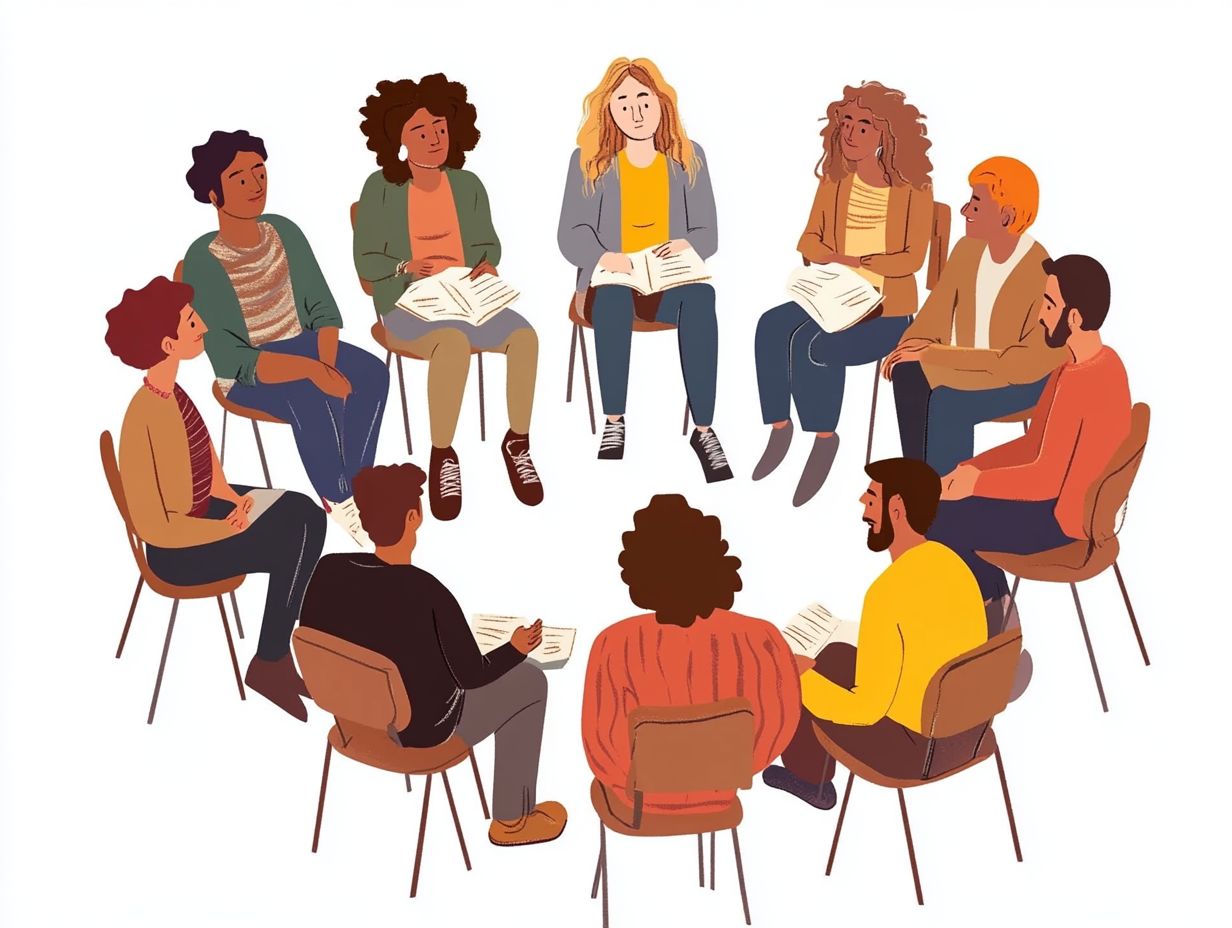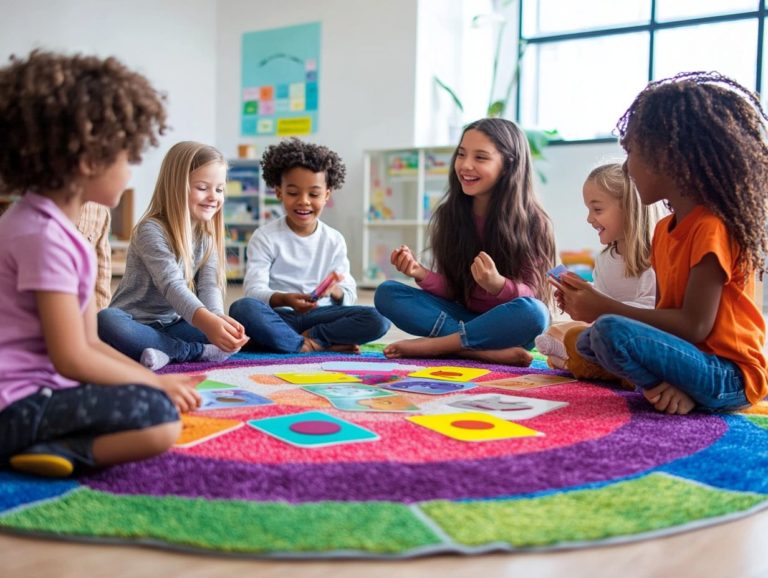The Benefits of Group Discussions for Emotional Awareness
Group discussions provide a dynamic platform for you to engage with others, fostering both communication skills and emotional awareness.
As you delve into the essence of group discussions and their various forms, you will uncover how they can deepen your understanding of emotions. This exploration highlights the significance of emotional awareness and its crucial role in cultivating empathy, social awareness, and self-awareness.
Additionally, you’ll find practical tips for facilitating effective discussions and emotional intelligence training.
Join us in discovering the multitude of benefits these conversations can offer, enhancing both personal growth and professional growth, as well as team dynamics.
Contents
- Key Takeaways:
- What Are Group Discussions?
- What Is Emotional Awareness?
- How Do Group Discussions Help With Emotional Awareness?
- What Are Some Tips for Effective Group Discussions?
- Frequently Asked Questions
- 1. What are the benefits of group discussions for emotional awareness?
- 2. How can group discussions improve emotional intelligence?
- 3. Can group discussions help in building empathy?
- 4. How can group discussions benefit personal growth, professional growth, and development?
- 5. Are there any specific techniques used in group discussions for emotional awareness and emotional intelligence training?
- 6. Are there any potential downsides to group discussions for emotional awareness, team dynamics, and emotional management?
Key Takeaways:

- Group discussions promote emotional awareness by encouraging openness and vulnerability, providing different perspectives, and increasing empathy, self-control, and understanding.
- Effective group discussions can be facilitated by setting ground rules, actively listening, respecting differences in opinions, keeping the discussion focused, and providing constructive feedback.
- Apart from emotional awareness, group discussions also promote critical thinking, enhance communication skills, build teamwork and collaboration, increase confidence and self-esteem, and improve coping mechanisms and conflict resolution skills.
What Are Group Discussions?
Group discussions serve as structured dialogues where you and your peers can share insights on a particular topic, promoting collaboration and honing your communication skills. These conversations are essential in both academic and professional environments, as they cultivate emotional intelligence (EQ) by creating a space of respect and understanding.
Furthermore, they enable you to enhance your emotional awareness and interpersonal relationships, which are crucial for effective teamwork, adept problem-solving, and fostering a positive workplace environment.
How Do Group Discussions Work?
Group discussions thrive on the dynamic interplay of diverse participants who come together to engage in a structured dialogue. This process allows you to explore various viewpoints and ideas, ultimately enhancing your communication and problem-solving skills.
In these discussions, you may find yourself assuming specific roles perhaps you take on the mantle of a facilitator, guiding the conversation, or become the diligent note-taker, capturing key points as they emerge. You might also be one of those active contributors, eager to share insights and pose thought-provoking questions.
Active listening is vital in these interactions, ensuring that you fully grasp each participant’s perspective and fostering an environment where everyone feels valued and understood. Providing constructive feedback with care elevates the quality of the discussion, encouraging growth, emotional intelligence, and clarifying any misconceptions that may arise.
Emotional regulation is critical, as it helps maintain a respectful atmosphere that promotes open dialogue, stress management, and frustration tolerance. Collaboration among group members becomes essential for achieving meaningful and effective outcomes that resonate with everyone involved.
What Are the Different Types of Group Discussions?
There are several types of group discussions you can engage in, such as brainstorming sessions, decision-making discussions, and problem-solving dialogues, each tailored to achieve specific outcomes and enhance collaboration, communication, and teamwork among participants.
In brainstorming sessions, the focus is on generating ideas without fear of immediate criticism, which invites creativity and fosters an open-minded atmosphere. On the other hand, decision-making discussions take a more structured approach, where evaluating options and reaching a consensus is paramount.
In terms of problem-solving dialogues, the emphasis is on identifying challenges and collaboratively crafting actionable solutions. These various formats not only clarify objectives but also strengthen peer relationships, as participants learn to communicate effectively and appreciate differing perspectives.
Participating in such collaborative efforts ultimately cultivates emotional intelligence, giving you the power to understand and manage your own emotions while also empathizing with others. This skill is essential for creating a harmonious team dynamic.
What Is Emotional Awareness?
Emotional awareness is your ability to recognize and understand both your own emotions and those of others. This skill is a cornerstone of emotional intelligence (EQ), significantly impacting your mental health, workplace stress, and the quality of your interpersonal relationships.
Cultivating this awareness allows you to navigate your feelings and interactions with greater insight and empathy.
Why Is Emotional Awareness Important?
Understanding your emotions can be a game changer in your life! Emotional awareness is crucial, serving as the cornerstone of emotional intelligence. It gives you the power to manage your emotions effectively, leading to enhanced mental health and more fulfilling interpersonal relationships.
By nurturing this awareness, you can navigate personal and professional challenges with greater ease, demonstrating resilience when faced with adversity. It allows you to identify your emotional triggers, which allows you to develop effective coping mechanisms and frustration tolerance that you can employ during stressful situations.
As a result, emotional awareness fosters personal growth through self-reflection and adaptive behavior. It also plays a significant role in your professional success. With this awareness, you become better equipped to empathize with others, a vital skill for successful collaboration, leadership, and employee development.
Ultimately, cultivating this heightened sense of emotional intelligence enhances your overall well-being, creating a positive feedback loop that enriches both your personal and professional interactions. It contributes to a positive environment and organizational culture, so don t wait to improve your emotional intelligence start today!
How Do Group Discussions Help With Emotional Awareness?
Engaging in group discussions is vital for developing emotional awareness. These conversations create a space where you can freely express your thoughts and feelings, encouraging empathy, self-reflection, and social skills among team members.
This dynamic not only strengthens your emotional intelligence but also significantly enhances your overall communication skills and client service abilities.
1. Encourages Openness and Vulnerability

Encouraging openness and vulnerability during group discussions allows you to share your emotions and thoughts freely, which is essential for developing emotional awareness and emotional intelligence. When you feel safe to express your true self without fear of judgment, it paves the way for authentic conversations and cultivates an atmosphere of trust.
This culture of openness promotes deeper emotional connections among team members and enhances your ability to empathize with one another’s perspectives. As a result, collaboration becomes more seamless, with each participant feeling valued and heard.
Such dynamics elevate the quality of discussions and strengthen relationships, driving the collective effort toward shared goals and inspiring creative problem-solving within the group.
2. Provides Different Perspectives
Group discussions offer you a valuable opportunity to present and explore diverse perspectives, enriching your emotional awareness and enhancing your ability to work together to solve problems.
By engaging in conversations that include a variety of viewpoints, you gain insight into the feelings and motivations of others while also challenging your own preconceived notions. This dynamic exchange fosters a deeper understanding of emotional responses, enabling you and your team members to respond with both empathy and creativity.
When you embrace diverse opinions, the synergy that develops can lead to unexpected solutions that might not arise in a more uniform setting. Encouraging this kind of dialogue is crucial for cultivating emotional intelligence, equipping you to navigate complex interpersonal dynamics both within and beyond the workplace.
3. Increases Empathy and Understanding
Engaging in group discussions allows you to cultivate empathy and understanding toward others. This enhances your emotional awareness and overall communication skills.
This shared dialogue provides you with the opportunity to actively listen to diverse perspectives and experiences. It fosters a deeper sense of connection among group members. For instance, when a teammate shares their challenges, your ability to practice empathy enables you to validate those feelings. This not only builds trust but also encourages more open communication and emotional regulation.
Such awareness paves the way for improved collaborations, where you and your fellow participants feel valued and understood. Ultimately, this enhances the group dynamics. Through these empathic exchanges, conflicts tend to be resolved more amicably. You re more likely to appreciate differing viewpoints, leading to healthier interpersonal relationships, group cohesiveness, and more cohesive teamwork.
4. Allows for Self-Reflection
Engaging in group discussions allows you to embark on a journey of self-reflection. This enables you to assess your emotional responses and cultivate a deeper emotional awareness an essential asset for both personal and professional growth. It also aids in improving self-management and workplace communication.
By immersing yourself in diverse perspectives, you can observe your reactions and biases in real-time. This provides insight into how your emotions influence your interactions. This practice fosters empathy and encourages critical thinking about your own feelings and behaviors.
As you navigate conflicting viewpoints or tackle challenging topics, you learn to regulate your emotional responses. This nurtures resilience and adaptability. Ultimately, this enhanced emotional intelligence leads to more effective communication and collaboration, fostering deeper interpersonal connections that support your personal development and contribute to positive group dynamics.
What Are Some Tips for Effective Group Discussions?
To conduct effective group discussions, you must implement strategies that enhance communication skills, encourage collaboration, and establish ground rules. These elements foster emotional intelligence among all participants. By doing so, you create an environment where everyone feels valued and heard, paving the way for meaningful dialogue and productive outcomes!
1. Set Ground Rules
Setting clear ground rules is essential for conducting effective group discussions. It establishes expectations for communication and nurtures emotional intelligence among participants.
By outlining these guidelines, you can create an environment where respect is paramount. This ensures that every voice is heard and valued. For example, you might encourage active listening by instituting a rule that participants paraphrase what others have said before responding.
Establishing a norm that minimizes interruptions fosters open communication. This paves the way for deeper understanding and collaboration. These practices not only enhance the overall dynamic of the discussion but also cultivate a sense of trust and camaraderie among group members. This ultimately leads to more productive outcomes!
2. Encourage Active Listening
Encouraging active listening among participants is essential for elevating group discussions. It enhances communication skills and nurtures emotional intelligence.
When you engage in active listening, you become more attuned to not just the words being spoken but also the deeper emotions and intentions woven into the conversation. This heightened level of engagement fosters a sense of trust and respect. It allows everyone to feel valued and understood.
Employing techniques such as paraphrasing, asking open-ended questions, and providing nonverbal feedback can significantly enhance listening skills within the group. As emotional awareness grows, misunderstandings diminish. This paves the way for a more cohesive and collaborative environment where individuals can freely and constructively share their ideas!
3. Respect Differences in Opinions

Respecting differing opinions is crucial in group discussions. It cultivates emotional awareness and enhances teamwork and collaboration.
When everyone feels heard and valued, they are more likely to share their thoughts openly. This enriches the pool of ideas.
For instance, in a project team, embracing various viewpoints can spark innovative solutions that might never surface if everyone simply went along with the majority.
This approach not only fosters deeper trust among group members but also nurtures a culture of empathy, where individuals come to appreciate one another’s experiences and values. By actively seeking out and respecting diverse opinions, you can help mitigate conflicts and create a more cohesive environment that drives effective collaboration and leads to better results.
4. Keep the Discussion Focused
Keeping group discussions focused is essential for fostering effective communication, allowing participants to engage meaningfully and enhancing both emotional intelligence and collaboration.
To achieve this, set a clear agenda at the start of each meeting. This will help everyone grasp the objectives and the topics that need to be addressed.
Such structure provides a roadmap that guides the conversation and encourages all members to remain on track. Make sure to stick to the agenda this makes every minute count!
Establishing time limits for each discussion point creates a sense of urgency and attentiveness, preventing anyone from drifting off-topic.
By emphasizing the importance of sticking to the agenda, participants become more conscious of their contributions, which supports productive interactions and elevates emotional awareness within the group.
What Are Some Other Benefits of Group Discussions?
Engaging in group discussions brings a wealth of advantages. They not only promote critical thinking but also enhance your communication skills, all while fostering teamwork and collaboration among everyone involved.
1. Promotes Critical Thinking
Engaging in group discussions fosters critical thinking by inviting you to analyze diverse viewpoints and cultivate well-rounded perspectives on a range of topics.
In these dynamic environments, you are often prompted to express your opinions clearly while also considering the insights of others. This process sharpens your reasoning skills and boosts your empathy.
Take, for example, a conversation about climate change; you may encounter a variety of opinions on potential solutions, compelling you to critically evaluate each option and assess its possible impacts.
This kind of dialogue sharpens your problem-solving skills as you navigate complex issues and simultaneously elevates your emotional intelligence, allowing you to gain a deeper understanding of your peers’ feelings and motivations throughout the discussion.
2. Enhances Communication Skills
By engaging in group discussions, you can significantly enhance your communication skills, which are essential for effective teamwork and collaboration across various contexts.
These skills encompass active listening, articulating your ideas clearly, nonverbal communication (the way we express ourselves without words, like gestures and facial expressions), and offering constructive feedback.
Strong communication helps build deeper relationships and understanding in your personal life. In professional settings, it can lead to improved project outcomes and sparks of innovation.
To further develop these vital skills, consider the following steps:
- Practice empathy by embracing diverse perspectives.
- Engage in reflective listening to ensure clarity in conversations.
- Actively seek constructive criticism to refine your delivery.
Participating in role-playing scenarios provides invaluable practice for managing group dynamics and enhancing collaborative dialogue.
3. Builds Teamwork and Collaboration
Group discussions serve as a remarkable catalyst for fostering teamwork and collaboration, inviting participants to unite toward shared objectives while cultivating a strong sense of group identity.
In these discussions, you create an atmosphere where individuals can express diverse perspectives, enhancing brainstorming sessions and deepening personal connections among team members. Emotional intelligence emerges as a vital asset in this context, giving you the power to navigate interpersonal dynamics with finesse. By being attuned to your own emotions and the sentiments of others, you encourage open and helpful conversations, nurturing a supportive environment.
A positive climate builds trust, enabling team members to share their ideas freely and dive into exciting challenges with one another. Ultimately, this synergy propels the team toward innovative solutions and collective success.
4. Increases Confidence and Self-Esteem
Engaging in group discussions can greatly enhance your confidence and self-esteem, as you receive positive feedback and learn to articulate your ideas with finesse.
This experience not only encourages you to express your thoughts more clearly but also nurtures a sense of belonging and validation within the group. Constructive criticism from peers is essential in this process, guiding you to identify areas for improvement while simultaneously reinforcing your strengths.
As you participate in discussions, you often gain a deeper understanding of your emotional responses and communication styles, which elevates your overall self-awareness. In this supportive environment, you build resilience, giving you the power to tackle challenges with a newfound confidence that transcends the group setting.
Frequently Asked Questions

1. What are the benefits of group discussions for emotional awareness?
Group discussions can help individuals become more aware of their emotions by allowing them to express themselves in a supportive environment and receive feedback from others. This can lead to a deeper understanding and acceptance of one’s emotions.
2. How can group discussions improve emotional intelligence?
Through group discussions, individuals can learn to identify and manage their emotions more effectively, which is a key aspect of emotional intelligence. Group discussions also allow individuals to learn from others’ emotional experiences.
3. Can group discussions help in building empathy?
Yes, group discussions can facilitate the development of empathy by providing a space for individuals to share their emotions and perspectives. This can help individuals understand and connect with the emotions of others, enhancing their emotional quotient (EQ) and social skills.
4. How can group discussions benefit personal growth, professional growth, and development?
Group discussions can promote personal growth, professional growth, and development by allowing individuals to gain insights into their emotions and behaviors through the perspectives of others. This can lead to self-reflection, enhanced self-awareness, and the opportunity to make positive changes, improve communication skills, and build stronger interpersonal relationships.
5. Are there any specific techniques used in group discussions for emotional awareness and emotional intelligence training?
Yes, some common techniques used in group discussions for emotional awareness and emotional intelligence training include active listening, reflective listening, and constructive feedback. These techniques can help facilitate a deeper understanding and exploration of emotions, improve emotional regulation, and build better coping mechanisms.
6. Are there any potential downsides to group discussions for emotional awareness, team dynamics, and emotional management?
While group discussions can be a valuable tool for emotional awareness and emotional management, some individuals may feel uncomfortable sharing their emotions in a group setting. Additionally, group dynamics and conflicts can arise, affecting workplace environment and team cohesiveness. It is important to have a skilled facilitator to ensure a safe and supportive environment, promote conflict resolution, and manage workplace stress.
If you are interested in enhancing your emotional awareness and interpersonal skills, consider participating in group discussions or seeking out further resources!






